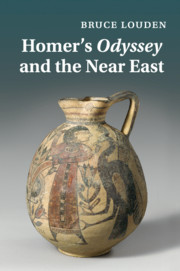Book contents
- Frontmatter
- Contents
- Acknowledgements
- Introduction
- 1 Divine councils and apocalyptic myth
- 2 Theoxeny
- 3 Romance
- 4 Odyssey 4
- 5 Odyssey 5
- 6 Odyssey 6–8, 10–12, 13.1–187; Genesis 28–33; Argonautic myth
- 7 Odysseus and Jonah
- 8 The combat myth
- 9 Catabasis, consultation, and the vision
- 10 Thrinakia and Exodus 32: Odysseus and Moses
- 11 The suitors and the depiction of impious men in wisdom literature
- 12 Odysseus and Jesus
- 13 Contained apocalypse
- Conclusion
- Bibliography
- Index locorum
- Subject index
2 - Theoxeny
Odyssey 1, 3, 13–22, and Genesis 18–19
Published online by Cambridge University Press: 04 February 2011
- Frontmatter
- Contents
- Acknowledgements
- Introduction
- 1 Divine councils and apocalyptic myth
- 2 Theoxeny
- 3 Romance
- 4 Odyssey 4
- 5 Odyssey 5
- 6 Odyssey 6–8, 10–12, 13.1–187; Genesis 28–33; Argonautic myth
- 7 Odysseus and Jonah
- 8 The combat myth
- 9 Catabasis, consultation, and the vision
- 10 Thrinakia and Exodus 32: Odysseus and Moses
- 11 The suitors and the depiction of impious men in wisdom literature
- 12 Odysseus and Jesus
- 13 Contained apocalypse
- Conclusion
- Bibliography
- Index locorum
- Subject index
Summary
Hospitality myth in general, and theoxeny in particular, is one of the two main types of myth that provide the Odyssey's larger overarching structures. While romance forms the Odyssey's outermost frame, and provides its ending (the recognition scenes with Penelope and Laertes, Books 23–4), theoxeny forms the frame directly within, providing the epic with its other climax, the destruction of the suitors in Book 22. I define hospitality myth simply as a mortal host entertaining or receiving a guest (usually a stranger of unknown identity) into his dwelling. Most of Books 1, 3–4, 9–10, 14–15, and 17–22 (with shorter treatments in Books 7–8), are detailed presentations of hospitality myth. The anthropologist Pitt-Rivers is one of many to assert the centrality of hospitality in the Odyssey (1977: 94), “Indeed the whole work may be viewed as a study in the law of hospitality.”
Hospitality is sacred. Both the Odyssey (Od. 9.270–1; 14.283–4, 14.389, 17.155; cf. 3.346) and the Iliad (13.624–5) declare Zeus its special guardian. As Bolin notes (2004: 39–40, 48), hospitality resembles sacrifice in being similarly grounded in reciprocity, as in the formula, do ut des, “I give, that you may give.” Though written about Genesis 18–19, Bolin's comments about the dynamics of hospitality in ancient cultures are equally applicable to Homeric episodes, and worth noting at length (2004: 45):
Hospitality was the creation of a temporary patronage relationship with the host as patron and the guest as client. The motivation behind offering hospitality to a stranger lay in the increased honor one had in assimilating a potential threat into the community by asserting one's superiority over the newcomer. […]
- Type
- Chapter
- Information
- Homer's Odyssey and the Near East , pp. 30 - 56Publisher: Cambridge University PressPrint publication year: 2011



